
"Stuck on You" was Elvis Presley's first hit single after his two-year stint in the US Army, reaching number one in 1960 in the US.

"If I Can Dream" is a song made famous by Elvis Presley, written by Walter Earl Brown of The Skylarks for the singer and notable for its similarities with Martin Luther King Jr.'s 1963 "I Have a Dream" speech. The song was published by Elvis Presley's music publishing company Gladys Music. It was recorded by Presley in June 1968, just two months after King's assassination, and also a short time after Robert Kennedy's assassination. The recording was first released to the public as the finale of Presley's '68 Comeback Special.
"Somos Novios" is a song first recorded by Mexican songwriter Armando Manzanero in 1968. Perry Como recorded an English version of "Somos Novios" with original English lyrics titled "It's Impossible", which was a top 10 hit in the US and the UK.

"You're My World" is a cover of Italian ballad originally recorded in 1963 as "Il mio mondo" by Umberto Bindi, who co-wrote the original version with Gino Paoli. Subsequently, an English version was commissioned, and the lyrics were written by Carl Sigman as "You're My World". The song reached No. 1 in Australia (twice), Belgium, Mexico, Netherlands, South Africa and United Kingdom in recordings by Cilla Black, Daryl Braithwaite, Guys 'n' Dolls and Helen Reddy. Black's and Reddy's versions reached the US Top 40 in 1964 and 1977, respectively. The song also reached No. 1 in France and Spain in the respective translations "Ce monde" and "Mi Mundo", both sung by Richard Anthony.

"Solitaire" is a ballad written by Neil Sedaka and Phil Cody. Cody employs playing the card game of solitaire as a metaphor for a man "who lost his love through his indifference"—"while life goes on around him everywhere he's playing solitaire". The song is perhaps best known via its rendition by Carpenters. Another version by Andy Williams reached number 4 in the UK Singles Chart in 1973.
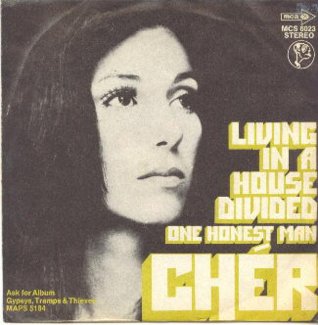
"Living in a House Divided" is a song by American entertainer Cher, released as the lead single from her album Foxy Lady. The song's lyrics discuss the separation of a couple, as a rather poignant descriptor of Cher's marriage to then-husband, Sonny. Due to Cher's feelings of resentment over Sonny's control of both her life and her career, their marriage soured. They divorced two years after this song became a hit.
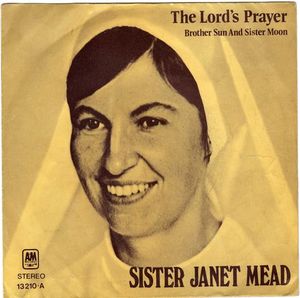
"The Lord's Prayer" is a pop rock setting of the Lord's Prayer with music by Arnold Strals recorded in 1973 by the Australian nun Sister Janet Mead. Mead was known for pioneering the use of contemporary rock music in celebrating the Roman Catholic Mass and for her weekly radio programs.

"Keep on Singing" is a 1973 song composed by Danny Janssen and Bobby Hart, and was originally recorded by Austin Roberts from the album Austin Roberts. It was released as a single on Chelsea Records and reached No. 50 on the U.S. Billboard Hot 100 and No. 39 on the Cash Box Top 100. In Canada it reached # 79. "Keep on Singing" was best known as a hit single by Helen Reddy in 1974.

"Only the Strong Survive" is a song written by Jerry Butler, Kenny Gamble and Leon Huff and originally sung in 1968 by Jerry Butler, released on his album The Ice Man Cometh. It was the most successful single of his career, reaching #4 on the Billboard Hot 100 and was #1 for two weeks on the Billboard Black Singles Chart, in March and April 1969, respectively.

"Cupid" is a song by the American singer Sam Cooke, released on May 16, 1961. It charted at number 17 on the Billboard Hot 100 and number 20 on the Hot R&B Sides chart; the track performed best in the United Kingdom, peaking at number seven on the UK Singles Chart. The song is featured on Cooke's greatest hits album, The Best of Sam Cooke (1962). Cooke's producers had asked him to write a song for a girl they had seen on a Perry Como TV show—but once they heard her sing, they kept "Cupid" for Cooke himself.

"Love on a Two-Way Street" is a soul ballad written by Sylvia Robinson and Bert Keyes in 1968. The song was originally recorded by Lezli Valentine, an artist signed to All Platinum, the record label that Sylvia Robinson co-owned with her husband, Joe. The song was then recorded by The Moments, an R&B vocal group signed to All Platinum subsidiary Stang Records, as filler for their 1968 album Not on the Outside, But on the Inside, Strong!. Sylvia and Joe decided to release the song as a single in March 1970 and it went on to become one of the biggest R&B hits of that year, spending five weeks at number one on Billboard's Soul Singles chart and reaching number three on the Hot 100 chart. Billboard ranked the record as the No. 25 song of 1970. It was also certified gold by the RIAA for sales of one million copies.
"My Boy" is a popular song from the early 1970s. The music was composed by Jean-Pierre Bourtayre and Claude François, and the lyrics were translated from the original version "Parce que je t'aime, mon enfant" into English by Phil Coulter and Bill Martin.

"That's Rock 'n' Roll" is a song written and originally recorded by Eric Carmen in 1976. It became a popular Billboard top 10 hit in 1977 for teen idol Shaun Cassidy.

"Walk a Mile in My Shoes" is a song written by Joe South, who had a hit with it in 1970. South was also producer and arranger of the track and of its B-side, "Shelter." The single was credited to "Joe South and the Believers"; the Believers included his brother Tommy South and his sister-in-law Barbara South.

"And the Grass Won't Pay No Mind" is a song written by Neil Diamond and recorded in 1969 on his Brother Love's Travelling Salvation Show LP. It was also featured on his live LP Hot August Night. Diamond's original became a minor hit in Australia before the song became a U.S. and Canadian hit for Mark Lindsay in the fall of 1970.

"Swearin' to God" is a song written by Bob Crewe and Denny Randell. It was recorded by Frankie Valli and released in May 1975 as a single from his album Closeup. It is a love song whose lyrical hook is a more literal use of the expression "I swear to God" :

"Romeo's Tune" is a song recorded by Steve Forbert, released in 1979 as the lead single from his album Jackrabbit Slim.
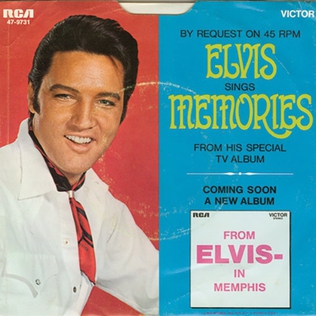
"Memories" is a 1968 song originally recorded by Elvis Presley.
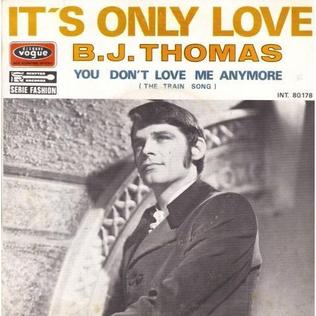
"It's Only Love'" is a 1969 song by B. J. Thomas from his LP Young and In Love. Elvis Presley made the song a top hit in the UK, reaching No. 3 in 1980.
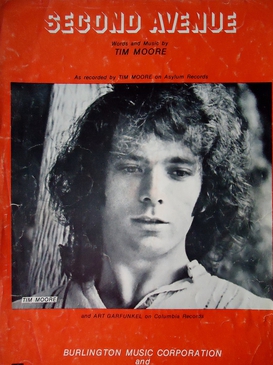
“Second Avenue” is a song written by American singer-songwriter Tim Moore. The song was released in 1974 as Moore's second single from his debut LP, concurrently with a version by Art Garfunkel, which received greater notice.


















